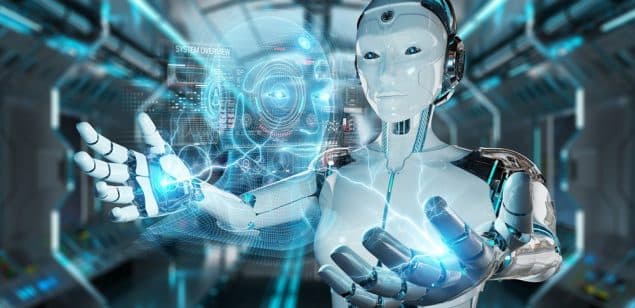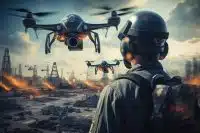Home » US business news » 7 Amazing Ways AI Is Changing Business
7 Amazing Ways AI Is Changing Business
https://www.whatjobs.com/news/usa/us-business-news/7-amazing-ways-ai-is-changing-business

By Hugh Fort in US business news, posted January 18, 2024

Artificial Intelligence (AI) is gathering momentum and headlines around the world as the technology rapidly progresses.
The advance of AI has been rapid and has led to some concerns from high-profile business leaders like Elon Musk over its impact on jobs in the future.
This week, OpenAI boss Sam Altman played down the fears over the technology's impact, saying he believes its effects won't be as drastic as some people believe.
While the debate is likely to rage on, there is little doubt the technology is greatly benefitting a range of industries.
Here are seven industries where AI is having a massive impact.
Healthcare and Medicine
AI in healthcare is a game-changer, offering transformative solutions across various domains.
In diagnostics, algorithms analyze images like X-rays and MRIs with remarkable accuracy, often identifying issues that are imperceptible to the human eye.
For example, Google Health's AI model can detect breast cancer in mammography with greater accuracy than human radiologists.
In drug discovery, the technology speeds up the process significantly, reducing costs and time.
Atomwise uses AI for atom-by-atom analysis to predict how different drugs will behave.
AI-powered wearable devices and apps also monitor vital signs and predict health issues before they become severe.
Companies like AliveCor offer FDA-approved EKG monitoring through a smartphone.
And in personalized medicine, technology is able to tailor treatment plans to individual genetic profiles, improving the efficacy of treatments.
IBM's Watson Health demonstrates this by analyzing the meaning and context of structured and unstructured data in clinical notes and reports.
Robotic surgery is becoming more precise and minimally invasive, reducing recovery times and improving patient outcomes.
These advancements signify a new era in healthcare, promising enhanced patient care, reduced costs, and groundbreaking medical research.
Environmental Conservation
AI's role in environmental conservation is becoming vital.
It offers innovative solutions to some of the most pressing ecological challenges.
In wildlife protection, tools like Microsoft's AI for Earth program help researchers monitor animal populations and predict threats, aiding in the preservation of biodiversity.
It also plays a crucial role in combating climate change.
For example, another Google subsidiary DeepMind has developed algorithms that significantly improve the energy efficiency of its data centers.
In agriculture, technologies are optimizing resource use, reducing water consumption and minimizing the environmental impact.
Companies like Blue River Technology also use the technology to enable smart spraying systems that precisely target weeds, reducing herbicide use.
AI is also instrumental in renewable energy management.
It can accurately predict energy demand and optimizes the distribution of wind and solar energy, enhancing the reliability of renewable energy sources.
Another example is IBM's solutions helping utility companies forecast electricity generation from renewable sources.
AI also assists in disaster response by predicting and managing natural disasters like floods and wildfires, enabling more effective and timely responses.
Finance and Banking
Finance and banking is an area that has seen some of the biggest frauds in corporate history.
Customers are also constantly being targeted by scammers looking to steal their information and money.
However, AI is revolutionizing the way institutions operate and interact with customers.
Fraud detection systems are more adept at identifying fraudulent transactions in real-time, significantly reducing financial losses.
For example, Mastercard uses AI to analyze transaction data, detecting anomalies that signal fraud.
In risk management, algorithms assess credit risk with greater accuracy, enabling more informed lending decisions.
Companies like ZestFinance use machine learning to analyze traditional and non-traditional credit data, improving loan underwriting.
Algorithmic trading automates trading decisions based on market data analysis, enhancing the efficiency and profitability of trading strategies.
Chatbots and virtual assistants, like Bank of America's Erica, provide personalized customer service, handling inquiries and transactions seamlessly.
AI in personal finance apps also offers customized financial advice and budgeting assistance, helping individuals manage their finances more effectively.
Robo-advisors, like Betterment, also use AI to provide automated, algorithm-driven financial planning services with little to no human supervision.
Autonomous Vehicles
The development of autonomous vehicles (AVs) is one of the most exciting, and controversial, uses of the new technology.
Self-driving cars, like those developed by Waymo, use a combination of AI algorithms, sensors, and cameras to navigate roads, recognize obstacles, and make decisions in real-time.
This technology promises to reduce traffic accidents, most of which are caused by human error.
However, there have been some doubts over the technology, with Tesla currently involved in a lawsuit after a driver was killed.
In logistics and delivery, companies like Amazon are experimenting with drones and self-driving trucks to optimize supply chains and reduce delivery times.
The use of AI in AVs also extends to public transportation.
In cities like Singapore, autonomous buses are being tested to improve public transit efficiency.
Technology in AVs contributes to reducing traffic congestion and lowering emissions, as these vehicles can optimize routes and driving patterns.
The integration of AVs into smart city infrastructures further enhances traffic management and urban planning.
However, the widespread adoption of AVs faces challenges, including regulatory hurdles, safety concerns, and ethical considerations in decision-making algorithms.
Despite these challenges, the advancements in AV technology continue to progress, promising a future which could have safer, more efficient, and environmentally friendly transportation options.
Language Translation and Communication
AI has dramatically improved language translation and communication, breaking down language barriers and facilitating global interaction.
Advanced translation services, like Google Translate and MachineTranslation.com, now offer real-time, near-accurate translations across numerous languages, making international communication more accessible.
These services use neural machine translation, which learns over time to produce more natural translations.
Duolingo, for instance, uses AI to personalize language education, adapting lessons to the learner's pace and style.
Technology is also enhancing accessibility for people with disabilities.
Tools like Microsoft's Seeing AI app help visually impaired individuals interpret the world around them through audio descriptions.
AI-driven translation enables companies to easily localize content for different markets, expanding their global reach. AI
These advancements in AI-driven language technologies are not only making communication more efficient but also fostering a more connected and inclusive world.
Education and Learning
AI is revolutionizing education by providing personalized learning experiences and automating administrative tasks.
AI-powered educational platforms, like Carnegie Learning, are able to adapt to students' learning styles and paces, offering customized content and assessments.
This personalization helps address diverse learning needs, improving student engagement and outcomes.
AI tutors and chatbots provide additional support, answering questions and offering guidance outside of traditional classroom settings.
For example, Georgia Tech's AI teaching assistant, Jill Watson, helps manage and respond to student inquiries in large classes.
AI also plays a significant role in grading and assessment, automating the evaluation of essays and assignments, thereby freeing up educators to focus on teaching and student interaction.
In special education, AI tools assist students with disabilities, offering tailored resources and support.
Beyond K-12 and higher education, AI is transforming corporate training and professional development through customized learning modules and performance tracking.
AI-driven analytics in education also helps institutions identify at-risk students and improve educational strategies.
These AI applications in education are not only enhancing learning experiences but also making education more accessible and efficient, paving the way for a future where everyone can benefit from personalized education.
Retail and E-commerce
AI is transforming the retail and e-commerce sector by personalizing the shopping experience and optimizing business operations.
Personalization algorithms, like those used by Amazon, analyze customer data to recommend products, enhancing the shopping experience and increasing sales.
AI chatbots, such as Sephora's Virtual Artist, provide customer service and personalized advice, improving customer engagement. In inventory management.
Follow us on X, LinkedIn, and Facebook














